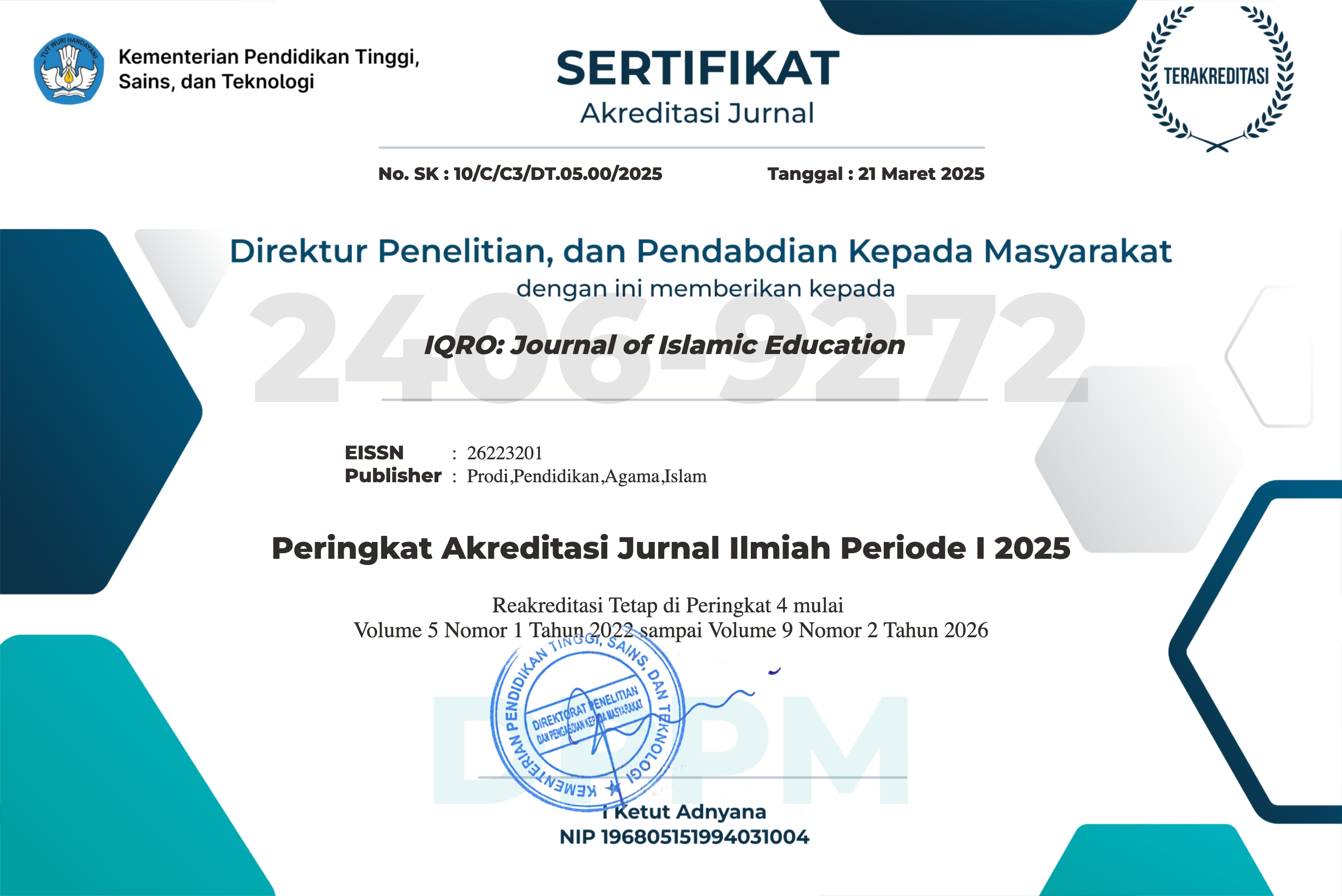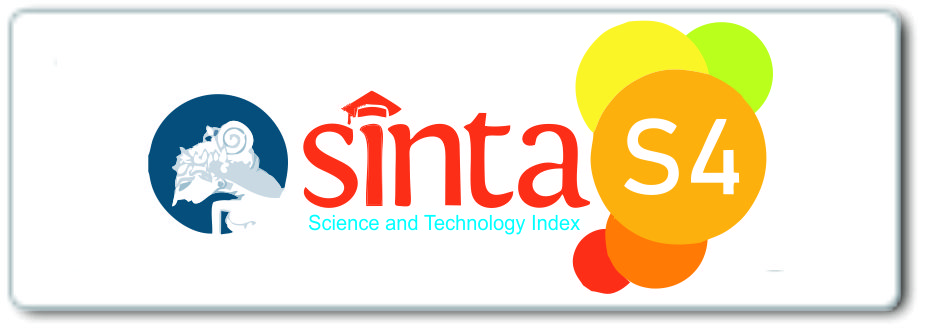Tingkat Kesejahteraan Spiritual Anak Binaan LPKA I Tangerang
DOI:
https://doi.org/10.24256/iqro.v7i2.6337Keywords:
Spiritual Wellbeing; PrisonersAbstract
Spiritual well-being itself has been recognized as the spiritual condition of individuals who feel their lives are good and can function optimally. Various studies have been conducted to reveal what factors can influence the level of spiritual well-being. Spiritual well-being in foster children can be a foundation for them in facing a critical and turbulent period at the completion of the sentence, because the problems faced in completing the sentence at LPKA can be felt increasingly concerning and transformed into critical personal problems because it has led to various forms of decline in the spiritual well-being of a foster child. Therefore, it is important to have happiness for foster children as an indicator of quality of life. The condition of spiritual well-being in foster children was assessed in terms of age, gender, socioeconomic status of parents, and intentional activities. The results of the study indicate that the average spiritual wellbeing is low and reveal that there are significant differences in the spiritual wellbeing of foster children in terms of gender, socioeconomic status of parents and involvement in intentional activities. The most influential dimension of spiritual well-being is usually found in environmental mastery, where children in the adolescent phase feel happy when they are able to master their environment well. The purpose of the research he conducted was to express the level of spiritual well-being of children fostered by LPKA I Tangerang. Thus, they can complete the period of serving their sentence in a timely manner. The stages of research methods through field research and descriptive qualitative approach by examining data in the form of scientific journals, books, and manuscripts. The results of this study are expected to have recommendations for higher education institutions, namely Islamic universities, especially in carrying out their duties as educational institutions that educate the lives of generations, require insight and knowledge related to aspects that can affect the development of students as individuals who continue to develop through the provision of lecture assignments not only in educational institutions but in correctional institutions so that students have new and many experiences and insights.
References
Anggraeni Helena Tjondro Sugianto, Priska Vasantan. 2020. “Pemberdayaan Masyarakat Melalui Peningkatan Kapital Spiritual.” (Journal of Service Learning). Vol. 6, No. 1, February 2020, 13-17 DOI: 10.9744/share.6.1.13-17 p-ISSN 2338-7866 / e-ISSN 2655-4720. 13.
Athifah Khoulah. 2024. “Pengaruh Pengabaian, Kesejahteraan Subjektif, Dan Keberagamaan Terhadap Kecenderungan Residivisme Pada Anak Binaan LPKA.” Universitas Islam Negeri Syarif Hidayatullah Jakarta. V.
Anugrahingwidi Wishnu. 2012. “Metode Bimbingan Agama Dalam Meningkatkan Kecerdasan Spiritual Anak Warga Binaan Sosial (WBS) Di Panti Sosial Bina Insan Bangun Daya 1 (PSBIBD 1) Kedoya Jakarta Barat.” Universitas Islam Negeri Syarif Hidayatullah Jakarta.
Dewi Kisuma Supandi. 2024. “Peranan Lembaga Pembinaan Khusus Anak Dalam Pembinaan Anak Delikuensi.” Jurnal Ilmiah Wahana Pendidikan, Juni 2024, 10 (11), 345-353 DOI: https://doi.org/10.5281/zenodo.12696660 p-ISSN: 2622-8327 e-ISSN: 2089-5364. 345.
Fijianto Dwi, Megah Andriany, Elis Hartati. 2020. “Studi Deskriptif Spiritual Well Being Warga Binaan Pemasyarakatan Laki-laki berdasarkan Usia di Lembaga Pemasyarakatan Kantor Wilayah Kementerian Hukum dan Hak Asasi Manusia Jawa Tengah: Studi Pendahuluan.” Jurnal Ilmiah Kesehatan Vol XIII, No I, Maret 2020 ISSN 1978-3167, E-ISSN 2580-135X. 34.
Hafidz M Ahdiansyah, Ratno, Ririn Linawati, Didik Ardi Santosa. 2024. “Pembinaan Mental dan Spritual Anak-Anak Jalanan yang Dinaungi Yayasan YBK Mofeta Semarang.” Universitas Ivet Manggali Jurnal Pengabdian dan Pemberdayaan Masyarakat https://doi.org/10.31331/manggali.v4i2.3435 Volume 4 Nomor 2 Tahun 2024, 307-312. 307.
Haniifah Nidaa. 2024. “Pengaruh Spiritual Connectedness Dan Emotional Intelligence Terhadap Psychological Well-Being Anak Binaan LPKA.” Universitas Islam Negeri Syarif Hidayatullah Jakarta. V.
Kothot Pieters Pindardhi, Jacquelinda Sandra Sembel, Maria Susila Sumartiningsih, Sumiaty Aiba. 2022. “Gambaran Koping Spiritual Remaja Pengguna Napza Di LPKA Kelas I Tangerang Dan Blitar.” Manuju: Malahayati Nursing Journal, Issn Cetak: 2655-2728 Issn Online: 2655-4712, Volume 4 Nomor 11 November 2022 DOI: https://doi.org/10.33024/mnj.v4i11.7192 Hal 3108-3118. 3108-3109.
Nobel Sharon. 2021. “Pemenuhan Kebutuhan Biopsikososial Dan Spiritual Pada Remaja Di Lembaga Pembinaan Khusus Anak (LPKA) Kelas II Bandung.” Universitas Padjadjaran. V.
Purwaningsih Prihatini, Budy Bhudiman. 2021. “Pola Pembinaan Narapidana Anak Di Bawah Umur (Studi Lembaga Pembinaan Khusus Anak Kelas I Tanggerang).” Yustini Jurnal Hukum & Hukum Islam Vol. 8, No. 2, September 2021, hlm 91-105. 91.
Pebri Igo Asah Saputra, Ali Muhammad. 2023. “Peran Orang Tua Dalam Menjaga Kepercayaan Diri Dan Emosi.” Politeknik Ilmu Pemasyarakatan Sindoro Cendikia Pendidikan Vol 1 No 5Tahun 2023 ISSN: 3025-6488 20-34.
Razkia Dwita, Ajeng Safitri, Santoso. 2021. “Menemukan Makna Hidup dengan Forgiveness Studi pada Siswa Binaan Remaja di Lembaga Pemasyarakat Anak Pekanbaru.” Psychopolytan : Jurnal Psikologi Issn Cetak : 2614-5227 Vol. 4 No. 2, Februari 2021 Issn Online : 2654-3672. 107
Sulistijaningsih Sri, Juntika Nurikhsan, Encep Nurdin, M.Sabri. 2024. “Implementasi pembiasaan pesantren untuk pembentukan karakter religius anak di lembaga pembinaan kelas IIa Bandung.” JPPI (Jurnal Penelitian Pendidikan Indonesia) Vol. 10, No. 4, 2024, pp. 282-289 DOI: https://doi.org/10.29210/020243513 ISSN: 2502-8103. 282.
Safriani Linda. 2023. “Bimbingan Agama Dan Perubahan Perilaku Anak Binaan Pemasyarakatan Di Lembaga Pembinaan Khusus Anak (LPKA) Kelas II Banda Aceh.” Universitas Negeri Ar-raniry Banda Aceh. i.
Zulian Arzan Afrodhi. 2023. “Manajemen Pembinaan Spiritual Warga Binaan Di Lembaga Pembinaan Khusus Anak Kelas II Bandar Lampung.” Universitas Islam Negeri Raden Intan Lampung. ii






 This is an open access article under the
This is an open access article under the 